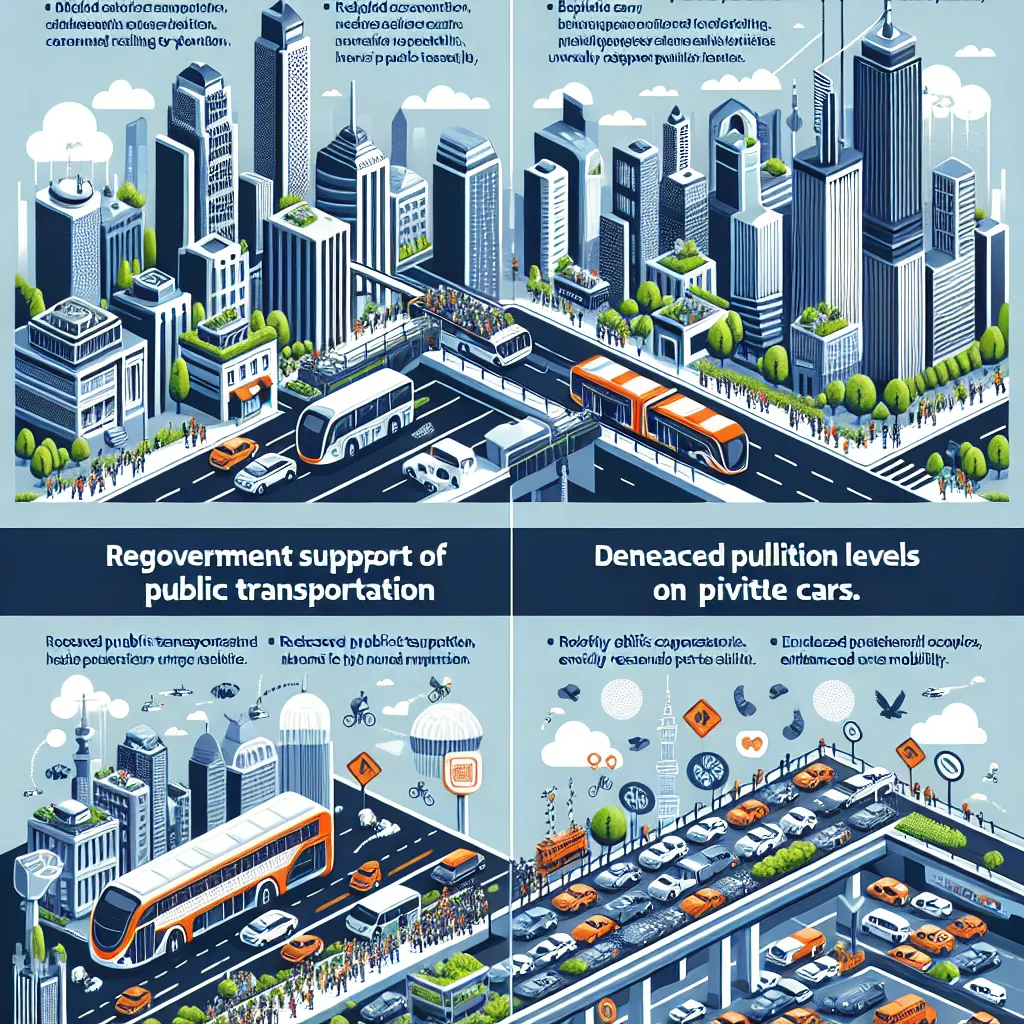Public transportation has become a crucial topic in IELTS Writing Task 2, appearing frequently in recent years. This trend is likely to continue, given the increasing global focus on sustainable urban development and environmental concerns. In this article, we’ll explore sample essays addressing the question of whether governments should prioritize public transportation, providing insights for different band scores.
Nội dung bài viết
Let’s examine a common IELTS Writing Task 2 question on this topic:
Some people think that governments should invest more money in public transportation to reduce traffic congestion and pollution in cities. To what extent do you agree or disagree?
Analyzing the Question
This question asks for your opinion on government investment in public transportation as a solution to urban problems. Key points to consider:
- The main issue: Government investment in public transportation
- The intended outcomes: Reducing traffic congestion and pollution
- The context: Urban areas (cities)
- The task: Express your level of agreement or disagreement
Remember to address all parts of the question in your response.
 Government Investment in Public Transportation
Government Investment in Public Transportation
Sample Essay 1 (Band 8-9)
Governments should indeed prioritize investment in public transportation as a means to alleviate urban congestion and reduce pollution levels. This essay will argue that such investment is not only beneficial but crucial for sustainable urban development.
Firstly, well-developed public transportation systems can significantly reduce traffic congestion in cities. By providing efficient alternatives to private vehicles, such as buses, trams, and metro systems, governments can encourage more people to leave their cars at home. This shift leads to fewer vehicles on the road, easing traffic flow and reducing commute times. For instance, cities like Singapore and Hong Kong have successfully implemented comprehensive public transport networks, resulting in smoother traffic despite high population densities.
Moreover, prioritizing public transportation is an effective strategy for combating urban pollution. Public transit vehicles, especially those powered by electricity or alternative fuels, emit far less pollution per passenger than private cars. As more people switch to these cleaner modes of transport, the overall air quality in cities improves. This has been demonstrated in cities like Oslo, where the introduction of electric buses and trams has contributed to a notable reduction in air pollution levels.
Investment in public transportation also promotes social equity and economic growth. Affordable and accessible public transit ensures that all citizens, regardless of their economic status, have the means to travel for work, education, and leisure. This increased mobility can lead to better job opportunities and economic participation for a broader segment of the population. Furthermore, the development and maintenance of public transportation infrastructure create jobs and stimulate local economies.
However, it is important to acknowledge that implementing effective public transportation systems requires significant initial investment and careful planning. Governments must consider factors such as population density, urban layout, and cultural attitudes towards public transport. Additionally, they should complement public transport initiatives with other measures like congestion pricing and improved urban planning to maximize the benefits.
In conclusion, the advantages of government investment in public transportation far outweigh the challenges. By reducing traffic congestion, lowering pollution levels, and promoting social and economic benefits, such investment is critical for creating sustainable, livable cities. Therefore, I strongly agree that governments should prioritize public transportation as a key element of urban development strategies.
(Word count: 352)
Essay Analysis (Band 8-9)
This essay demonstrates excellence in several key areas:
-
Task Response: The essay fully addresses all parts of the question, presenting a clear position with well-developed arguments.
-
Coherence and Cohesion: The ideas flow logically, with each paragraph focusing on a distinct aspect of the argument. Linking words and phrases are used effectively.
-
Lexical Resource: The essay employs a wide range of vocabulary accurately and appropriately, including topic-specific terms like “congestion pricing” and “urban planning.”
-
Grammatical Range and Accuracy: The essay uses a variety of complex structures correctly, with only minor errors.
-
Examples: Relevant examples (Singapore, Hong Kong, Oslo) are provided to support the arguments.
-
Balanced View: The essay acknowledges potential challenges, demonstrating a nuanced understanding of the topic.
Sample Essay 2 (Band 6-7)
I agree that governments should invest more money in public transportation to reduce traffic congestion and pollution in cities. This essay will discuss the reasons why this is important and some of the benefits it can bring.
Firstly, investing in public transportation can help reduce traffic congestion in cities. When there are good public transport options like buses and trains, fewer people need to drive their own cars. This means there are less cars on the road, which makes traffic flow better. For example, in big cities with good subway systems, people can travel quickly without adding to traffic jams.
Secondly, public transportation is better for the environment than private cars. Buses and trains can carry many people at once, which means they produce less pollution per person than if everyone drove their own car. Also, many cities are now using electric buses, which are even cleaner. This can help improve air quality in cities, which is good for people’s health.
Another benefit of investing in public transportation is that it can help people save money. Using buses or trains is often cheaper than owning and maintaining a car, especially with the high cost of fuel these days. This can be especially helpful for people with lower incomes, giving them more affordable ways to travel to work or school.
However, it’s important to note that improving public transportation can be expensive and take a long time. Governments need to plan carefully and might need to raise taxes to pay for new transport systems. Also, some people might still prefer to use their own cars, so it’s important to make public transport convenient and comfortable.
In conclusion, I believe that governments should invest more in public transportation. While there are challenges, the benefits of reduced traffic, less pollution, and more affordable travel options for citizens make it a worthwhile investment for cities.
(Word count: 309)
Essay Analysis (Band 6-7)
This essay demonstrates competence in several areas but has room for improvement:
-
Task Response: The essay addresses the main points of the question and presents a clear position.
-
Coherence and Cohesion: The essay has a logical structure, but the use of cohesive devices could be more sophisticated.
-
Lexical Resource: The vocabulary is appropriate but lacks the range and precision of higher band scores.
-
Grammatical Range and Accuracy: The essay uses a mix of simple and complex sentences, with some errors that do not impede understanding.
-
Examples: The essay provides some examples, but they could be more specific and developed.
-
Depth of Analysis: While the main points are covered, the analysis could be deeper and more nuanced.
Key Vocabulary to Remember
- Public transportation (noun) – /ˌpʌblɪk trænspɔːˈteɪʃn/ – Systems of transport available for public use
- Traffic congestion (noun) – /ˈtræfɪk kənˈdʒestʃən/ – Excessive number of vehicles on a road
- Urban development (noun) – /ˈɜːbən dɪˈveləpmənt/ – The growth and improvement of towns and cities
- Sustainability (noun) – /səˌsteɪnəˈbɪləti/ – Ability to maintain at a certain level without depleting resources
- Infrastructure (noun) – /ˈɪnfrəstrʌktʃə(r)/ – Basic physical systems of a country or organization
- Emission (noun) – /ɪˈmɪʃn/ – The production and discharge of something, especially gas or radiation
- Commute (verb/noun) – /kəˈmjuːt/ – Travel some distance between one’s home and place of work on a regular basis
- Accessibility (noun) – /əkˌsesəˈbɪləti/ – The quality of being easily reached, entered, or used
- Incentivize (verb) – /ɪnˈsentɪvaɪz/ – Motivate or encourage someone to do something
- Livability (noun) – /ˌlɪvəˈbɪləti/ – The suitability of a place for living in terms of comfort and quality of life
Conclusion
The topic of government prioritization of public transportation is likely to remain relevant in IELTS Writing Task 2. To prepare, practice writing essays on related themes such as:
- The role of technology in improving public transportation
- Balancing public transportation investment with other urban development needs
- Encouraging people to use public transportation over private vehicles
- The impact of public transportation on social equality
- Comparing different public transportation systems across cities or countries
Remember to structure your essays clearly, use a range of vocabulary and grammatical structures, and support your arguments with relevant examples. Feel free to share your practice essays in the comments section below for feedback and discussion. This active engagement will help you improve your writing skills and prepare effectively for the IELTS exam.


